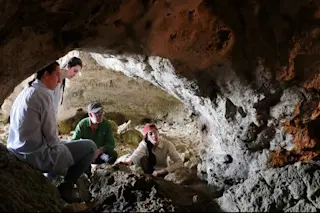A series of underwater caves off the southern coast of Sicily holds clues about Ice Age-era human migration. A team of ‘citizen scientists’ — including a tugboat captain and both recreational and Italian navy divers — helped discover them.
The findings, reported in PLOS ONE, describe 25 caves and rock shelters that show signs of human occupation from about 17,000 years ago. Many scholars consider Sicily to be among the first islands humans settled in the Mediterranean.
In this case, the researchers were interested in what plants and animals inhabited the island before humans entered, what the geology was like when they arrived, and, possibly, how activities like hunting and foraging could have changed the island’s environment.
“There is a very complicated puzzle here that we are trying to tease out,” says Ilaria Patania, an archeologist at Washington University in St. Louis.
Pinpointing when humans arrived in Sicily is only ...














